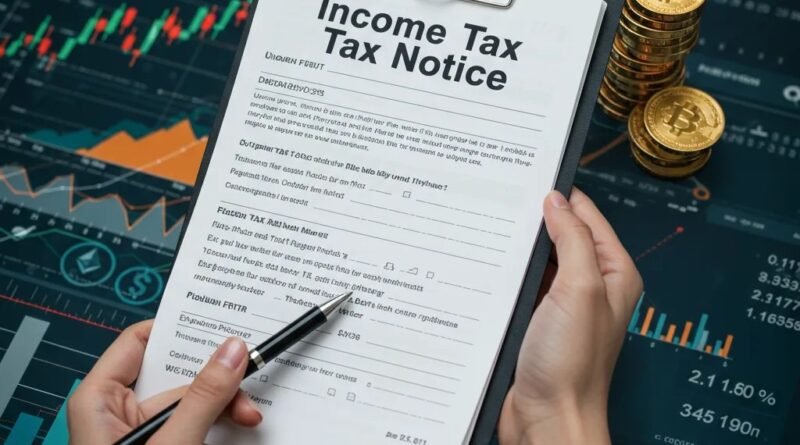Income Tax Department Ramps Up Scrutiny on Crypto Gains: Thousands Receive Notices
New Delhi, India – The Income Tax Department (ITD) has intensified its crackdown on undisclosed income from Virtual Digital Assets (VDAs), commonly known as cryptocurrencies. In a significant move, thousands of individuals and entities across India have recently received tax notices, urging them to declare their crypto trading profits and ensure compliance with existing tax laws. This initiative is part of the Central Board of Direct Taxes (CBDT)’s “NUDGE” campaign, aimed at promoting voluntary tax compliance through data analytics and reminders.
The Intensified Scrutiny
Sources within the ITD indicate that data analytics has revealed a substantial number of taxpayers who have either failed to file the dedicated ‘Schedule VDA’ in their Income Tax Returns (ITRs) or have declared their crypto income at lower tax rates, sometimes erroneously claiming cost indexation benefits. To address this, the department is actively cross-referencing ITR filings with Tax Deducted at Source (TDS) data provided by Virtual Asset Service Providers (VASPs), or crypto exchanges. Discrepancies found are triggering these notices.
This marks the third “NUDGE” campaign by the CBDT in the last six months, with previous campaigns focusing on foreign asset declarations and bogus deduction claims. The current drive underscores the government’s increasing focus on ensuring that gains from the burgeoning crypto market are brought under the tax net.
Understanding Crypto Taxation in India
The taxation framework for VDAs in India was introduced through the Finance Act, 2022, and remains unchanged in Budget 2025. Key provisions include:
- Flat 30% Tax on Gains: Any income arising from the transfer of VDAs (selling, trading, or even spending crypto for goods/services) is subject to a flat 30% tax, plus applicable surcharge and cess. This rate applies irrespective of the holding period (no distinction between short-term or long-term gains) and the nature of income (investment or business).
- No Deductions (Except Cost of Acquisition): Taxpayers are generally not allowed to deduct any expenses, such as exchange fees, transaction costs, or mining-related expenses, except for the actual cost of acquiring the digital asset.
- No Loss Set-Off or Carry Forward: Losses incurred from VDA transactions cannot be set off against any other income, nor can they be carried forward to subsequent years.
- 1% TDS on Transactions: A 1% Tax Deducted at Source (TDS) under Section 194S is applicable on payments made for the transfer of VDAs if the transaction exceeds ₹50,000 in a financial year (or ₹10,000 in certain cases for specified individuals/HUFs). This TDS is often automatically deducted by Indian exchanges. For transactions on foreign exchanges or peer-to-peer (P2P) transfers, the buyer is responsible for deducting and remitting the TDS.
- Gifted Crypto: The value of gifted cryptocurrency is taxable in the hands of the recipient under “Income from Other Sources,” with exceptions for gifts from close relatives or those valued under ₹50,000.
- Undisclosed Income: Budget 2025 has further tightened norms, stating that VDAs can now be considered part of undisclosed income in search and seizure cases, attracting higher tax rates (potentially up to 60% without deductions).
What This Means for Crypto Investors
The recent notices serve as a clear reminder for all individuals and entities involved in cryptocurrency trading to review their tax filings diligently. The ITD’s enhanced data analytics capabilities mean that undeclared or under-declared crypto income is increasingly identifiable.
Taxpayers who have received notices are advised to:
- Review ITRs: Carefully re-check their Income Tax Returns for Financial Year 2022-23 and 2023-24 (Assessment Years 2023-24 and 2024-25) to ensure all crypto gains are accurately reported in Schedule VDA.
- File Updated Returns: If any discrepancies are found or income was not declared, consider filing an updated ITR (ITR-U) to rectify the omissions and pay the due taxes along with applicable interest and penalties.
- Maintain Records: It is crucial for crypto investors to maintain meticulous records of all their transactions, including purchase and sale dates, acquisition costs, and sale prices, to substantiate their tax filings if required.
- Consult a Tax Professional: Given the complexities of crypto taxation, especially concerning international transactions or specific scenarios like airdrops, mining, or staking rewards, consulting a qualified tax advisor is highly recommended to ensure full compliance and avoid future penalties.
The government’s consistent efforts to bring VDAs under a comprehensive tax regime signal a maturing regulatory landscape for cryptocurrencies in India. Voluntary compliance is encouraged, but strict measures are in place for those who fail to adhere to the tax laws. The “NUDGE” is a clear signal: it’s time for crypto traders to get their tax affairs in order.

